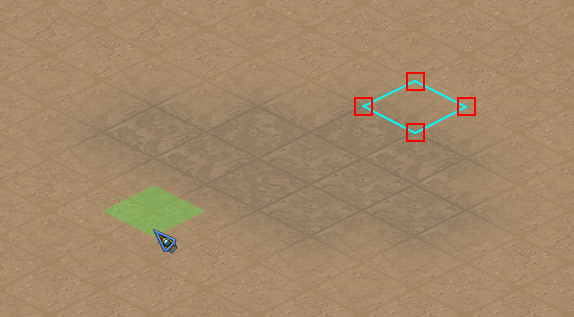Surface - atom description
Revision as of 15:57, 12 February 2021 by Polarski.nepos (talk | contribs) (→Properties description)
General description
- Surface atoms represent graphical representation of each tile.
- Type of Surface on specific tile is determined by set Grid atoms of its four vertices.
- In the image above you can see single Surface in the cyan rhombus and its four Grid in the red rects.
- Left and bottom Grit atoms are of type soil and top and right are of type desert, so the result Surface atom is transition from soil to desert.
Properties description
| Name | Type | Default value / Obligatory |
Description |
|---|---|---|---|
| grid | atom<Grid> | obligatory | Main Grid of this Surface |
| masque | masque | obligatory | Surface masque. |
| neighbor_grid | atom<Grid> | null | Transition Grid of this Surface |
| neighbor_transition | int | obligatory if neighbor_grid set |
Transition type |
| grass | atom<Grass> | null | Grass representation atom. |
| grass_ending | atom<Grass> | null | Grass ending representation atom. |
Properties in detail
supported_subsoils
- Each Grid can support multiple "subsoils".
- Each subsoil is determined by single letter.
- These subsoils are then used to determine is specififc buildings is allowed to be built on a specific place.
- For example soil and desert have both type
G(as a ground) and that means that standart buildings can be built on them.
surface_representant
- Sometimes you can have multiple Grid atoms which are different is some properties, but which do not influence which Surface should be used with them. For example soil without water power and soil with water power in base mod.
- In such cases is best to choose one of them as a representant because it reduces number of required surface atoms.
